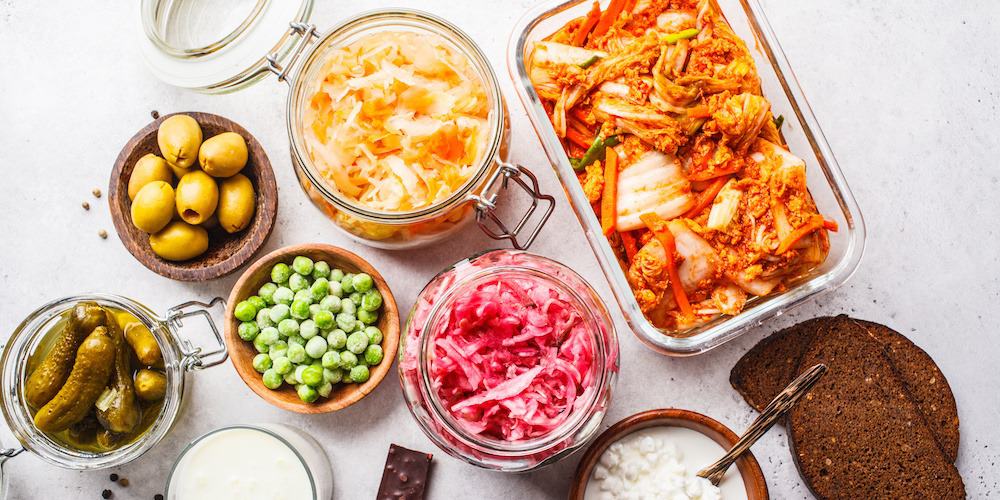Probiotics are microorganisms that inhabit the vaginal, oral, and intestinal flora and integrate into natural microbiomes. Their activity is believed to be beneficial for the body, although scientists are divided on their action.
Their consumption helps to maintain the microbial flora initially present in our body and boost its activity.
They are available commercially in the form of dietary supplements, but natural probiotics can also be found in certain foods!
Here is our top 5 list of foods that take care of your intestines. Check out the list to understand their mechanisms of action.
Also read the What are the best probiotic supplements?
1. Fermented milk
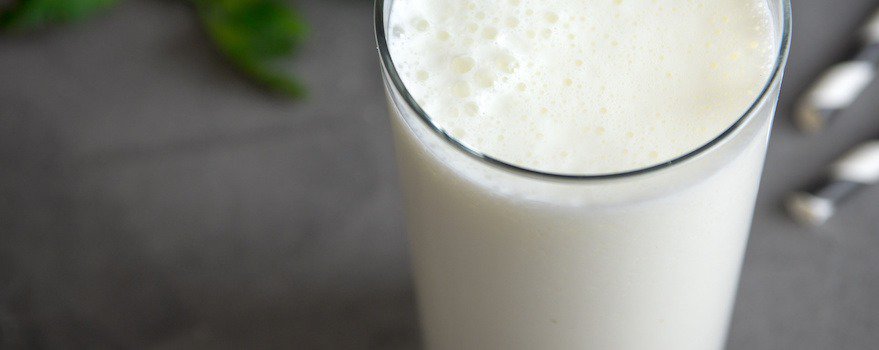
Fermented milk and products made from this ingredient contain lactic bacteria, including bifidobacteria and lactobacilli. These probiotic families improve intestinal transit.
People who do not particularly like fermented milk can consume yogurts. Many brands offer products supplemented with probiotics. Eating a yogurt daily as a dessert or snack helps take care of the intestinal microbiome.
2. Fermented cabbage

Chopped cabbage under fermentation contains mineral salts (magnesium, potassium, calcium) and vitamins (A, B, E). It also contains lactic acid, which promotes the elimination of intestinal parasites as well as the regeneration of intestinal membranes.
To prepare fermented cabbage, you just need to let pieces sit for a few days in salted water with other garden vegetables. This ingredient is used to prepare sauerkraut, an ideal lunch dish as it is rather filling.
To lighten the dish, it is preferable to prepare a seafood sauerkraut, cooked with fish and seafood instead of sausages and smoked bacon. Kimchi, a traditional Korean dish, is also a tasty and spicy example of fermented cabbage!
3. Kefir
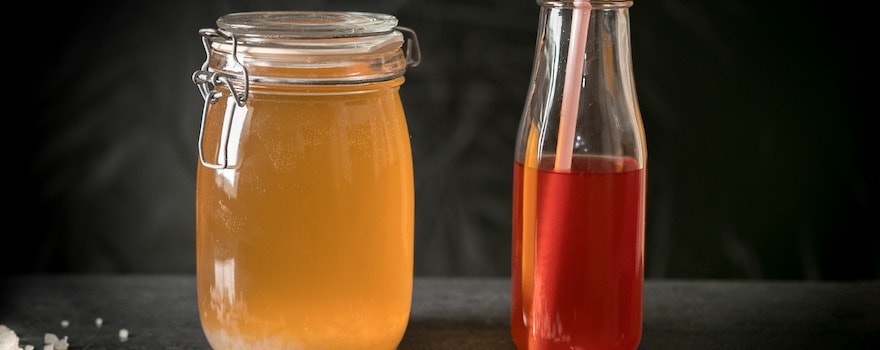
Kefir is a natural probiotic known since antiquity. Indeed, fermented kefir grains were consumed with goat, camel, or cow’s milk. The fermentation of kefir grains produces lactobacilli. Consumption of this food improves digestion and facilitates lactose tolerance.
Fermented kefir can be consumed as a drink. To prepare it, simply mix 4 tablespoons of kefir grains in 1 L of water, fruit juice, or milk. This mixture is left to ferment overnight, then consumed progressively throughout the following day.
4. Miso
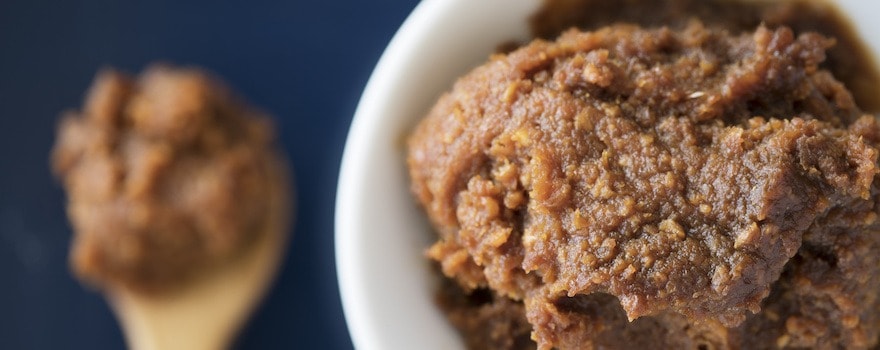
Miso is a condiment used in Japanese cuisine. It’s a paste made from fermented soybeans, rice, and barley. The probiotics present in miso help reduce symptoms of Crohn’s disease and bloating.
Miso is an ingredient that can be incorporated into many recipes. The Japanese primarily use it to season their soups. Miso can also be used to prepare risottos, broths, or custards.
5. Spirulina
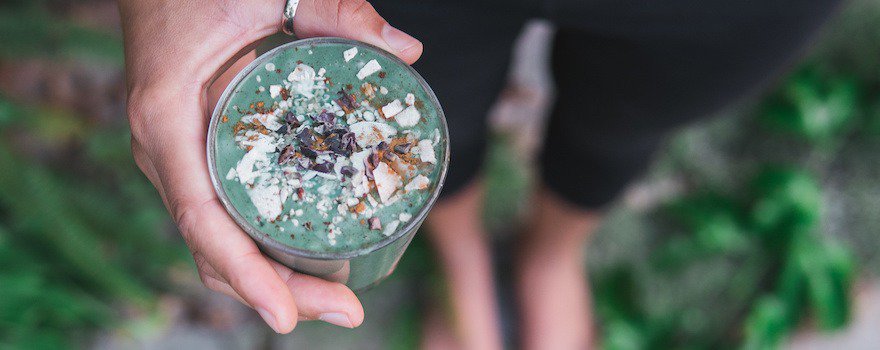
Spirulina is a cyanobacterium that contains numerous nutrients. It stimulates the development of lactic bacteria in the intestines. It also contains antioxidants and has an anti-inflammatory action.
Spirulina is available in pharmacies and para-pharmacies, generally in powder and flake form. It can be added to drinks, soups, or broths to make it easier to consume.
Buying natural probiotics: my selection
When your diet does not suffice to meet your probiotic needs, or as part of a supplement course, turn to probiotics in the form of dietary supplements.
The question of choice is not so much about the safety of the products, but their effectiveness – some probiotics have no concrete effect.
I always recommend flavonoid probiotics from Nutri&Co. They contain 9 strains, including 3 patented ones, as well as prebiotics (flavonoids).
It should be noted that this probiotic-prebiotic combination is rare and complicated to implement in a capsule.
I really like Nutri&Co because it is a particularly precise French lab (see their blog for instance). By eliminating all intermediaries, they can offer high-quality products at a really affordable price.
❤ I like: The excellent value for money, the complete transparency regarding the origin of raw materials, the effectiveness observed by users on Amazon.
★ Customer reviews (Ekomi) : 4.7/5
☞ Quantity: 60 capsules / 1 to 2 months of cure
✔ Our test: Nutri&Co Promo Codes
What is the microbiota?
To understand what probiotics are, it is essential to focus on microbiomes. A microbiome defines all the microorganisms that inhabit a particular living environment such as the mouth, the vagina, or the intestines.
This term replaces the previously used “microbial flora”.
The microorganisms found in the mucous membranes and the above-mentioned areas are bacteria or fungi that are not pathogenic. Their balance helps maintain a beneficial flora for the body.

If an imbalance occurs for some reason, certain pathologies may appear (mycoses, infections, inflammatory diseases…). Antibiotic treatments, for example, partially destroy this microbial flora.
The intestinal microbiota is the most important in the human body. Indeed, the intestines and the colon contain approximately 2 kg of microorganisms.
Imagine the digestive tract is colonized by 100 trillion bacteria, and it is home to hundreds of distinct bacterial species!
What is the action of probiotics?
There are different varieties of probiotics. The main varieties of these microorganisms are as follows:
- The lactic bacteria which include: lactobacilli (Lactobacillus or L. acidophilus, L. casei, L. rhamnosus, L. reuteri, L. gasseri, L. plantarum) and bifidobacteria (B. bifidum, B. longum, B. breve)
- The streptococci (S. thermophilus)
- The saccharomyces (S. Boulardi)
The list of existing probiotics is not definitive because there are many categories.
Their main functions are to:
- Strengthen the immune system (in children, the elderly, or when it is weakened). They ensure a stimulating effect on the production and release of B and T lymphocytes, real immune cells.
- Strengthen the intestinal mucosa barrier function or limit microbial attacks by replacing harmful bacteria for the body and preventing their adherence at the intestinal level.
- Produce substances that limit the activity of exogenous bacteria and neutralize the toxins secreted by these latter
- Strengthen the immunity of other mucous membranes, particularly the pulmonary and urogenital mucous membranes.
- Reduce inflammation on a local level
Probiotics exert a different action depending on the strain concerned. Indeed, lactobacilli, in general, exert a bactericidal action against Helicobacter pylori germs. They thus help to prevent H. pylori infections, which cause many gastritis and gastro-duodenal ulcers.
- L. fermentum is effective against infants’ atopic eczema and certain winter ailments, such as bronchitis and rhinopharyngitis.
- The strains L. rhamnosus GG, L. casei Defensis, L. bulgaricus, and S. thermophilus, L. casei Shirota exert a beneficial action during diarrhea episodes.
- Against respiratory and gastrointestinal infections, L. reuteri protectis are particularly effective.
And this list is not exhaustive!
Probiotics present in food are alive, ensuring their efficacy: when they reach the digestive tract, they act directly on the microbiota.
The dietary supplements containing probiotics are thus presented in so-called enteric-coated capsules, meaning they dissolve at the intestinal level. Indeed, the acidity of the stomach destroys most of the present strains.
The active bacteria content is expressed in millions/billions or in the number of colony-forming units per gram (CFU/g).
Probiotics do not colonize the digestive tract, they merely pass through it. The surplus of microorganisms not utilized by the body is naturally eliminated.
Therefore, it is necessary to replenish supplies daily.
Side effects and contraindications
Taking probiotics may cause the appearance of intestinal gas in some individuals. It may also cause intestinal irritation at the start of intake.
Probiotics are contraindicated for people on corticosteroids, undergoing radiotherapy or chemotherapy, those who are immunocompromised (suffering from lymphoma, AIDS), and those experiencing digestive disorders (nausea, vomiting, abdominal pain).
In such cases, it is advisable to seek medical advice before starting supplementation.
Compiled by Sabrina Biodore, nurse and health writer, and Charlotte Jean


